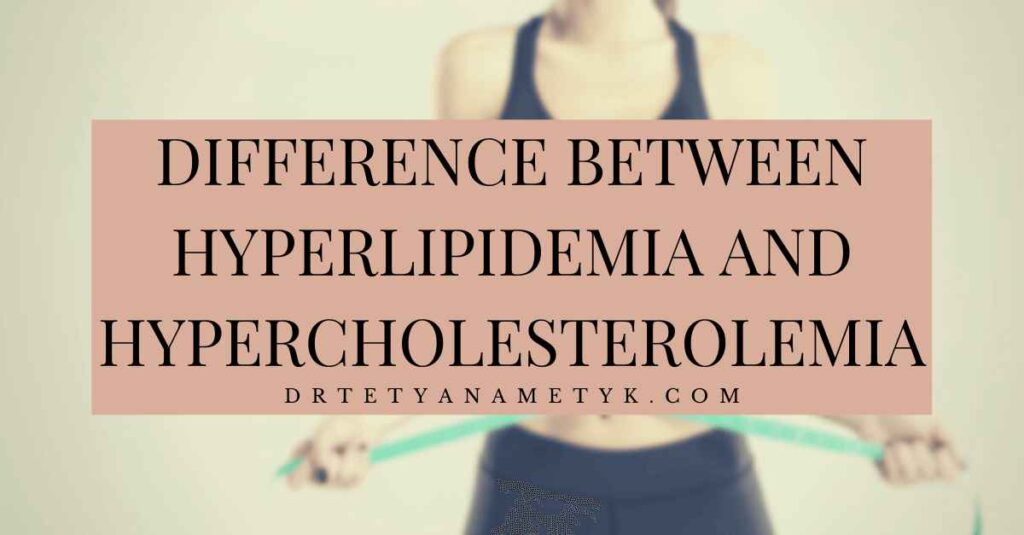The diseases are becoming more common because you do not know the symptoms and treatments of that disease as there is a lack of awareness about the conditions. Hyperlipidemia vs hypercholesterolemia are diseases associated with the deposition of fats, cholesterol, and lipids in the blood. Hyperlipidemia vs hypercholesterolemia can be inherited. It occurs when you intake a lot of fat or lipid-rich diet and are not active or not exercising as needed.
Hyperlipidemia results from a high level of cholesterol, fats, or triglycerides in your diet or eating a lot of fried food with saturated fats. Hyperlipidemia is defined as an elevated cholesterol level such as LDL, also known as bad cholesterol in the blood. Cholesterol levels should be in the normal range as per the body’s need because it plays a vital role in metabolism or metabolic processes.
But when the level gets higher than the normal level, then it is risky as it leads to heart-related diseases or heart-attack and also leads to stroke as the person suffering from hyperlipidemia have difficulty in breathing plus the plaque which is formed as a result of an accumulation of cholesterol deposit or lipid deposit in the blood vessels and blocks them, blood is not supplied as expected so this causes high blood pressure related problems and damages the vessels and muscles, so heart-attack is the ultimate consequence.
The Comparison of the terms hyperlipidemia vs hypercholesterolemia results in a high level of plasma cholesterol level in the blood compared to the normal plasma triglycerides. It may result from a high level of apolipoprotein-B, which is rich in apo-B lipoprotein, also known as the low-density lipoprotein. The term “familial hypercholesterolemia” results from altering a gene in one of the parents, which is passed down to the offspring. The person suffering from hypercholesterolemia may be born with this condition.
Hyperlipidemia vs Hypercholesterolemia
In the medical context, a high cholesterol level in human blood is referred to as hyperlipidemia or hypercholesterolemia. If you define cholesterol, then it is known as the fat, which is essential at a low or moderate level, if it exceeds the average level, then the cholesterol fat which works for the metabolic processes will be in excess, which is harmful as the elevated level is known as hyperlipidemia vs hypercholesterolemia. Hyperlipidemia has raised the level of lipids or fats in the blood, and hypercholesterolemia has raised the level of cholesterol.
The familiar cause of polygenic hypercholesterolemia is the interaction of the obscure genetic factors intensified by a sluggish lifestyle and when a person intake lots of saturated or trans-fats. Hyperlipidemia is verified when the total cholesterol level is above 200 mg/dL, and hypercholesterolemia is identified or diagnosed when the LDL cholesterol level is above 130 mg/dL.
The major difference between the two terms hyperlipidemia vs hypercholesterolemia is that hyperlipidemia is defined as the high fat or cholesterol level in the blood, such as triglycerides. Hypercholesteremia is defined as a high level or quantity of non-HDL high-density lipoprotein and LDL (bad) cholesterol in one’s blood.
Familial hypercholesterolemia is also identified as familial hyperlipoproteinemia type-2 or Fredrickson class 2a kind of hyperlipidemia. It is a type in which autosomal dominant inherited genetic disease leads to a raised quantity of blood cholesterol. Hyperlipoproteinemia is the condition in which the body fails to break down lipids and fats into a more straightforward form. More types of hyperlipoproteinemia depend on the concentration or quantity of lipids and depend on which is going to be affected.
Causes, Symptoms, and treatment comparison of hyperlipidemia vs hypercholesterolemia
Let’s look at the causes of hyperlipidemia vs hypercholesterolemia. Hyperlipidemia is associated with the raised amount or level of lipids or fats in the blood. On the other hand, hypercholesterolemia refers to high cholesterol or triglycerides in the blood. Hypercholesterolemia is one of the forms of hyperlipidemia, i.e., the usual dominantly inherited genetic disease all around the world.
If a person’s diet is not nutritious enough to meet the body’s needs, if a person is obese and has a desk-bound routine, he is at risk of suffering from hyperlipidemia. Smoking, taking too much alcohol, and not exercising are the most common or primary causes of hyperlipidemia.
In contrast, hypercholesterolemia results from genetic mutation resulting in the genes such as LDLR, APOB, and PCSK9 genes, which affect the way body regulates or controls the fat or cholesterol level. According to medical research, 60 to 80% of people suffering from hypercholesterolemia have mutation or changes in one of the genes. A few Secondary Causes of Hypercholesterolemia are as follows:
- Adrenal steroids.
- Isotretinoin.
- Thiazides.
- Anticonvulsants.
- Oral contraceptives.
- Alcohol.
If hyperlipidemia is not diagnosed or treated, it leads to a high level of cholesterol that forms or builds upon the walls of the arteries. Vessels become narrowed, leading to the blockage and reducing the blood flow or transport to the heart. This condition is known as atherosclerosis.
The following factors cause high-level triglycerides:
- Obesity.
- Poorly controlled diabetes.
- An underactive thyroid (hypothyroidism).
- Kidney disease.
- Regularly eat more calories than you burn.
- Drinking a lot of alcohol.
Symptoms of hypercholesterolemia are the following:
- Fatty skin aggregates called xanthomas over parts of the hands, elbows, knees, ankles.
- Cholesterol lump in the eyelids (xanthelasmas)
- Chest pain (angina) or other symptoms of coronary artery disease may be present at an early young age.
- The cramping of one or both calves while walking.
Among the symptoms of hyperlipidemia, the usual symptoms are that it can increase your risk for conditions that have symptoms, including angina (chest pain caused by heart disease), high blood pressure, stroke, and other circulatory ailments.
Treatment for hyperlipidemia vs. hypercholesterolemia includes changing lifestyles. Still, if changing the routine does not affect or does not lower your LDL bad cholesterol, the physician may recommend you take medicine like statins, but if it is not effective, take other mRNA and monoclonal antibody drugs as well to lower cholesterol to the minimum level.
The treatment for hypercholesterolemia is that it is usually treated with lifestyle changes or dietary changes, exercise, and smoking, or with statin therapy or the bile-acid sequestrants, nicotinic acid and lovastatin are the best and effective ones in treating hypercholesterolemia which decreases the concentration of LDL- cholesterol by 15% to 35%.
Conclusion
So, you have to avoid fatty food and trans-fat and change your lifestyle to reduce your blood cholesterol and lipid or fat level. The major difference between hyperlipidemia vs hypercholesterolemia is listed here. Both the diseases are referred to as increased or elevated levels of cholesterol and lipids.
But to overcome these conditions, you have to take care of diet and exercise to lower cholesterol and eat healthy food, vegetables, and fruits. You should develop the habit of taking healthy food plus exercising daily to reduce cholesterol. Otherwise, it’s lethal, and if left untreated, heart attack and stroke are the results.
Are you looking for hyperlipidemia vs hypercholesterolemia treatment? For more information, visit our Website. You can Contact Us and book your appointment with a professional doctor.

